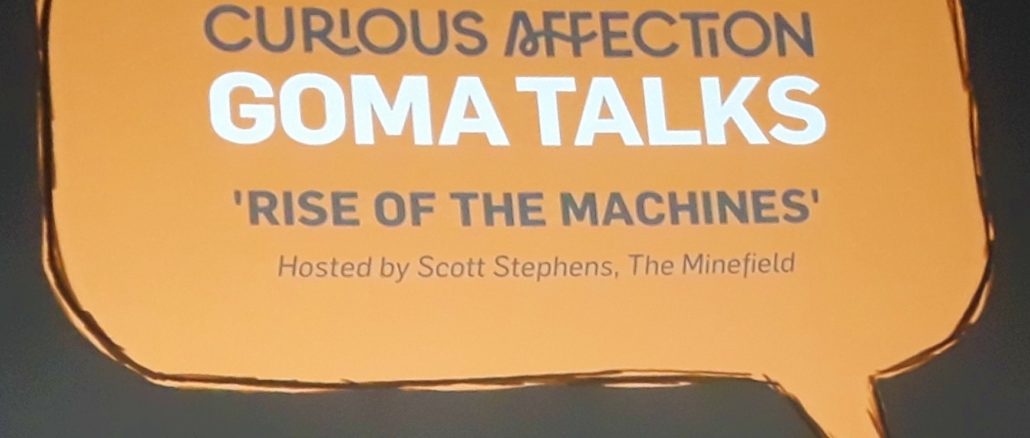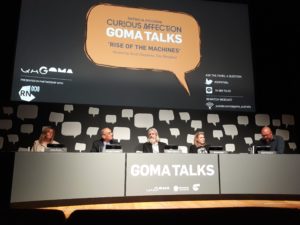
How do we navigate our ethical obligations to both our fellow humans and our creations in a future in which artificial intelligence and robotics are commonplace?
That question was posed at Brisbane’s Gallery of Modern Art (GOMA) last Thursday evening (26th April) at Rise of the Machines – the first of two GOMA Talks panel discussions set against Patricia Piccinini’s intriguing Curious Affection exhibition. Piccinini’s fantastic but familiar hybrid creatures invite us to wonder about where the line is drawn between human and non-human form in a world of genetic engineering and advances in biotechnology.
Scott Stephens, editor of the ABC’s Religion and Ethics website and host of ABC Radio National’s The Minefield, hosted the session, with a panel made up of professors of philosophy and engineering, a fellow in art history and a writer and creator of alternative reality games.

In our own image
What is behind the human desire to create tools that both stand apart from, and look like, us? Christy Dena, who created Robot University as part of her Digital Writing Residency at the Queensland University of Technology, suggested we make robots in our own image to better understand ourselves through the process of creation. That process can also trigger the ‘uncanny valley’ effect, in which humanoid objects that appear similar to, but not quite the same as, human beings can elicit feelings of both familiarity and revulsion in us.
Do no harm
With his long straight grey hair and goatee beard, Professor Robert Sparrow looks every inch the philosopher and ethicist. Above all else, Robert demands the right to be safe from being killed by the robots that we create and agrees with a 2017 report on Artificial Intelligence by the House of Lords that states the “autonomous power to hurt, destroy or deceive human beings should never be vested in artificial intelligence”.
Robert lamented the increasing loss of human-to-human contact. He believes damage is being done by reducing humans to service the machines by clicking on links, pushing buttons and adjusting our gait to get through automatic doors. In his view, technical sciences have been elevated at the expense of humanities. We need to talk to other people!
Design: engineering versus art
Professor Hussein Abbass brought the calm, logical and well-considered perspective one might expect from an engineer. Hussein described a search for perfection and an eagerness for power through extension of technology but challenged the view that engineers are to blame for increasing de-humanisation of our world. While the challenge is exciting, design is informed by society’s expectations and is based on solid and scientific definition of requirements – not a desire to control.
Art historian Dr Anita Pisch said art approaches these questions non-scientifically and with an open mind. If we can understand how something works at an atomic level, will we find the spirit when we build it? In our old age, do we want to be cared for by people or machines? Anita was emphatic that she doesn’t want to be cared for by robots in her old age. Rather, she’ll “have 20 cats and wear a tea cosy” on her head.
The panel agreed that technology can be more than just a tool. While it can improve well-being, there is a risk if it is created primarily by “male nerds”. We need diversity of ideas and perhaps we need to emulate indigenous cultures and seek the wisdom of our elders in design.
Immigrants from the future – our obligations
In The Economist, British science writer and author Oliver Morton described robots as “the immigrants from the future”. Do we owe anything to them? The late Stephen Hawking, Tesla CEO Elon Musk and other eminent scientists endorsed the Artificial Intelligence Code – a set of 23 principles established to ensure that the self-thinking machines that we design remain safe and act in humanity’s best interests.
Despite their wide-ranging backgrounds and views, the panel appeared united in the view that while robots can expand what it means to be human, they should be designed in line with society’s expectations to support those in need.
The panel
The panellists were:
- Hussein Abbass, Professor in the School of Engineering and Information Technology at the University of New South Wales Canberra
- Christy Dena, writer-designer-director, Universe Creation 101 and QUT Digital Writing Residency recipient
- Anita Pisch, author and Visiting Fellow, School of Literature, Languages and Linguistics, Australian National University
- Robert Sparrow, Professor in the Philosophy Program, a Chief Investigator in the Australian Research Council Centre of Excellence for Electromaterials Science, and an adjunct Professor in the Monash Bioethics Centre, Monash University, Melbourne.
What’s next?
The second session in the series, In Our Image, will explore in more detail our fascination with creatures built in our own image. It be held on Thursday 3 May from 6:30-7:30 p.m. in Cinema A at GOMA. Entry is free and bookings are not required. Just turn up, settle back with a glass of wine (yes – actually in a glass) from the pop-up bar, and enjoy the lively discussion.
Anne Brosnan is an aspiring author who runs a (very) small consulting company. When she’s not immersed in corporate strategies and project plans, you’re likely to find her engrossed in a book, seeing the latest play at a local theatre or planning her next travel adventure.

Great article! Sorry to have missed these insightful and thought-provoking talks.